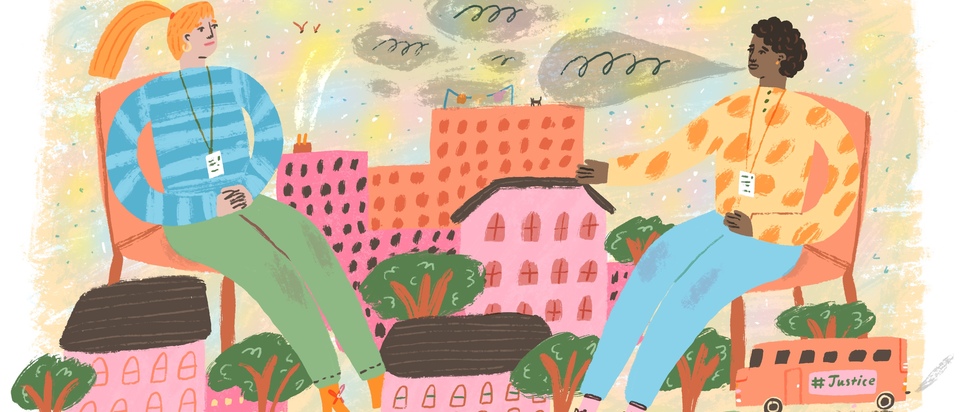Another Way: Unpacking transformative justice
The justice system isn't always all that just. Prisons and dodgy public spending, policing and state violence – but what if there was another way? We have a closer look at transformative justice and explore its potential in Scotland's future
When we look towards Scotland’s future, we ought to question who has a say in painting this vision. All of us – or only those deemed citizens? Alternative ideas about who we include in society, what we provide them, and how we treat them have been growing from whispers to demands. And so, we have questions. Is it possible to reform the police, the devil we know? Or can we trust in other solutions instead?
Transformative justice challenges how we address harm. It asks us to put mutual accountability and social support at the centre of rehabilitation. It helps us rethink the category of harm-doer and victim as constantly fluctuating positions. It understands the root causes of ‘crime’ as a lack of resources and support. It is time for Scotland to move on from a reactionary, oppressive justice system towards a preventive one.
From 2021-22, Police Scotland resolved, on average, 54% of all crimes reported to them. Crimes were more likely to be solved when the police used search powers, but ‘clear up rates’ (the number of crimes where the police have the evidence to prosecute) for harm involving more than one person, such as sexual violence or theft, have declined over the last five years. And, the number of people waiting for trial in prison reached a historic high in Scotland this year.
Policing creates criminalisation: it uses the law to make an action illegal and punishable. It is not simply a response to an action. Criminals are then physically and socially separated from citizens, who the police serve and protect. What happens in this separation is hidden from view in police custody and ‘not fit for purpose’ prisons like HMP Barlinnie. The Scottish Prison Service and construction company Kier have publicly boasted of their ‘community-facing’ woodland development, inaccessible to inmates but invaluable to maintaining the skyline for Alexandra Park golfers.
Glasgow Prisoner Solidarity Network has been campaigning against the construction of HMP Glasgow, replacing the Victorian-era HMP Barlinnie as Scotland’s largest jail. Predictably, private companies reap the benefits even after a decade of austerity. Kier has a £100 million budget for the prison (although, already at a £300 million overspend). Constructing mega-prisons gives undue trust and resources to the prison service and entwines the government with private companies that benefit from a growing prison population. These resources would have a more mutual and long-lasting impact if given to our public services, where caring professionals – doctors, teachers, support workers – can identify the support people need to stop harm to themselves and those around them.
Criminalised behaviour is often a response to the conditions of an environment. Instead of investigating these environments, prisons freeze individuals in time, where their struggles compound with the consequences of incarceration. Their first-hand account of state and oppressive violence is de-platformed whilst lobbyists and executives direct policy behind closed doors. The work of transformative justice is to stop abuses of power and give everyone the same stake in building a safe community. Again, any demands for a radically progressive Scotland should include the infrastructure for social care separate from the cycle of violence.
And, under the police, we become complicit in extending the violence of everyday policing to those arriving in our country. The UK and Scottish governments have orchestrated a hostile environment for migrants, exposing how criminalisation is used to further the oppression of chosen groups. When migrants enter the UK, they cannot drive, work, or rent independently and must pay for anything more than GP care. Every person they work for or receive a service from is involuntarily recruited to act as part of an informal border force via mandatory right-to-work/reside checks. Slipping this into our job roles normalises suspicion and criminalisation, creating the illusion of consent to policing. This separation of legal and illegal citizens leaves us feeling paranoid and reliant on the police.
Capitalism, patriarchy, white supremacy, ableism, and more – these forces structure how we live. These harms do not exist in a vacuum but are interconnected. They support each other to further privilege some and deny the humanity of others. Police Scotland have found themselves to be institutionally racist and sexist. The police claim to help the most vulnerable, but their unquestionable power to surveil and remove people from society exposes them as a source of oppression in our lives. Transformative justice, however, allows us to practise community-led interventions – using local skills and relationships to understand how harm has impacted everyone’s safety and what can be done to support all parties involved. With person-centred processes, the police will no longer be the only answer.
Transformative justice gives us a path towards changing the injustice marginalised communities experience in Scotland. It can help us introduce new ways of addressing harm and create a society that serves everyone, not just the powerful and influential. We can put our resources towards an independent, non-carceral social care network that keeps us safe and cared for. Bringing transformative justice to Scotland’s future centres the communities that have been historically hidden away. Support for them means support for us all. In finding solidarity, we make a better Scotland possible.
